Artificial Intelligence (AI) is a topic that consistently takes the spotlight and is an indispensable part of our society. As an Application Consultant at Simms & Associates, I am passionate about staying at the forefront of workforce management advancements and constantly on the lookout for innovative solutions to enhance workforce management. In this blog, I will explore how AI can revolutionise WFM and the strategies that can be implemented within our customers’ workforce management environments.+
Talent Acquisition and Recruitment
AI is changing the game in talent acquisition and recruitment. It streamlines processes by automating tasks such as CV screening, skill matching, and candidate shortlisting. This not only saves time but also ensures a more objective evaluation of candidates. What’s intriguing is the personalisation AI brings to recruitment. By analysing candidate data beyond qualifications, it identifies traits and qualities that align with company values and team dynamics. This allows organisations to build a workforce that not only possesses the right skills but also fits seamlessly into the corporate culture.
Performance Management
Performance management is the linchpin of WFM, and AI has transformed the way it’s approached. Through sophisticated algorithms and real-time analytics, AI empowers managers to swiftly identify areas that need attention or improvement. AI’s real strength lies in its ability to continuously monitor employee performance data, from productivity levels to goal achievement rates and feedback from peers and mentors. This data-driven approach enables tailored coaching programmes that nurture individual professional growth. Employees receive precise guidance, which translates into increased job satisfaction and improved performance.
Employee Engagement
Employee engagement is a critical factor in organisational success, and AI-powered platforms are taking centre stage in maintaining high levels of engagement. These platforms monitor employee sentiment through various communication channels, providing valuable insights. By analysing feedback and behavioural patterns, AI detects engagement trends and delivers customised recommendations. This proactive approach helps organisations identify and address issues early on, creating a more motivated and satisfied workforce.
Learning & Development
In the context of learning and development, AI-driven solutions have opened new possibilities. These systems efficiently identify skill gaps and recommend targeted training modules, allowing employees to acquire the skills they need rapidly. What sets AI-driven learning apart is its personalisation. It tailors content and training schedules to individual needs and learning styles, ensuring comprehensive understanding before moving on. This not only enhances learning outcomes but also fosters continuous skill development.
Workforce Analytics
Informed decision-making is vital in WFM, and AI facilitates data-driven insights. By evaluating metrics such as staff retention rates, diversity ratios, and skill distribution, AI empowers organisations to make strategic decisions.
With AI, organisations can proactively manage their workforce and devise growth strategies. Predictive analytics help anticipate staffing needs, identify potential issues, and make real-time adjustments. This agility enables organisations to stay competitive in a constantly evolving business landscape.
In conclusion, AI is undoubtedly a game-changer, optimising talent acquisition, performance management, employee engagement, learning and development, and workforce analytics. By harnessing AI, we can create more efficient, engaged, and skilled workforces, ultimately driving long-term success for our clients in the dynamic business world. The future of HCM is undoubtedly intertwined with AI, promising even greater transformation and innovation.
Would you like to find out what AI can do for your workforce improvement? Plan a free consultation with me or one of our other consultants.
